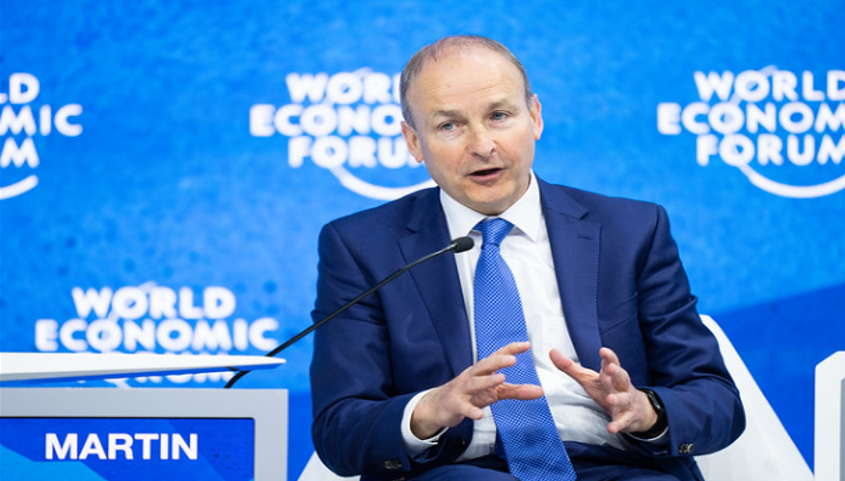In a statement delivered to the Dáil, Taoiseach Micheál Martin expressed significant concern over recent U.S. tariffs, which could have serious ramifications for Ireland’s economy and trade relations. The announcement of new tariffs by the U.S. administration on April 2nd, 2025, which include a 20% blanket tariff on all EU exports, comes as part of a broader protectionist shift in U.S. trade policy.
U.S. Tariffs: A Growing Concern for Ireland
Taoiseach Martin emphasized that these tariffs, which came into effect on April 5th, are damaging to global financial markets and could have long-term negative consequences for the global economy. This new policy reflects a growing trend of trade protectionism, notably from the U.S., under the current administration, which risks undermining the open and global trade system that has benefited Ireland for decades.
The 20% tariff will directly impact Irish exporters across various sectors, including steel, aluminium, and automotive products. Ireland’s trade relationship with the U.S. is worth an estimated €380 billion, and this increase in tariffs is already leading to slowed orders, particularly in industries that depend heavily on U.S. markets.
Potential Impact on Key Sectors
While the immediate focus is on tariffs on steel and cars, there are concerns that the U.S. will soon target other sectors, such as pharmaceuticals, which could disrupt Ireland’s substantial role in this industry. Martin highlighted that the pharmaceutical sector, which involves complex supply chains and long-term investment, would be severely impacted by further tariffs. He urged the U.S. to reconsider its approach, stressing that disrupting the sector could have dire consequences for global supply chains, as seen during the COVID-19 pandemic.
EU’s Response and Ireland’s Position
The EU, led by President Ursula von der Leyen, has responded by emphasizing the need for dialogue and negotiation with the U.S. rather than escalating tensions with tariffs. Martin aligned with the EU’s strategic response, which includes countermeasures affecting about €22 billion of trade between the EU and U.S. These measures, which could take effect as early as April 15, are aimed at protecting EU businesses and citizens from the impact of U.S. tariffs.
However, the Taoiseach underscored the need for calm and strategic engagement rather than retaliatory action, pointing out that tariffs are ultimately counterproductive, driving inflation, and hurting consumers on both sides. He also expressed concern about the tariffs’ potential effect on Northern Ireland and the all-island economy, particularly in sectors with interconnected supply chains like agrifood.
Ireland’s Economic Resilience
Despite these challenges, Martin conveyed confidence in Ireland’s economic resilience, emphasizing the country’s strong economic performance in recent years, with nearly full employment and significant job growth across regions. Ireland remains committed to a free and open trade agenda, believing that open trade drives economic opportunity, job creation, and innovation.
Ireland’s position within the EU gives it significant leverage, as the union represents one of the largest markets globally. Martin’s government is focused on maintaining competitiveness and controlling costs, with plans to bring forward an Action Plan on Competitiveness and Productivity in the coming months.
Moving Forward: Collaboration and Support
As Ireland faces this evolving trade challenge, the government has pledged to continue its collaborative efforts with both EU partners and industry stakeholders to minimize the impact on businesses and workers. Supports are already available, including grants for strategic assistance, market diversification, and digital innovation. Additionally, the Short-Time Working Scheme and Jobseeker’s Pay-Related Benefit are available to support workers affected by reduced demand due to the tariffs.
Conclusion
Taoiseach Micheál Martin has called for strategic patience and a measured approach in navigating the complex challenges posed by the new tariffs. Ireland, as part of the EU, remains committed to dialogue and negotiation with the U.S., while preparing to implement countermeasures to protect Irish interests. The government is also focused on long-term solutions, such as investments in infrastructure, innovation, and competitiveness, to ensure Ireland remains attractive to investment and resilient in the face of global trade disruptions.
By continuing to work within the framework of the EU, Ireland aims to protect its businesses, safeguard jobs, and maintain its position in the global economy while advocating for a fair and open trade system that benefits all nations.
Ireland Taoiseach Michael Martin Picture from World Economic Forum on Flickr by Boris Baldinger.



